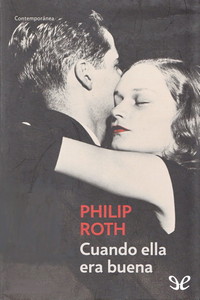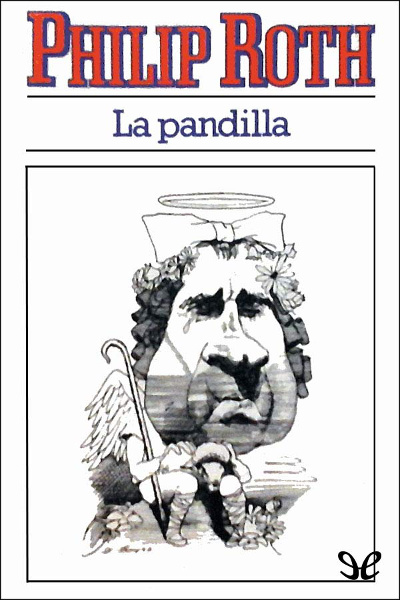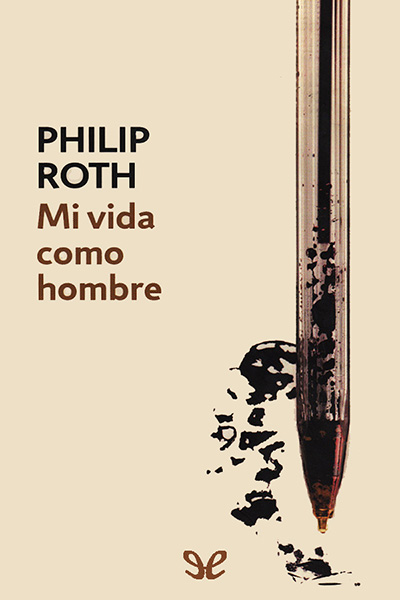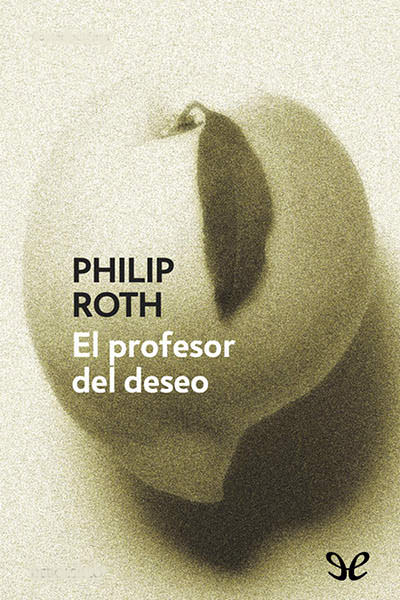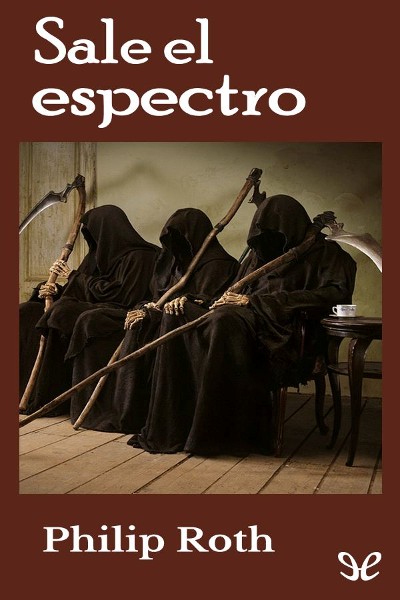oleebook.com
(1995) SabbathВ’s Theater de Philip Roth
de Philip Roth - GГ©nero: English
Sinopsis
Philip Roth Publisher: Vintage Classics, Year: 2011 ISBN: 9781407018638
Libros Recomendados - Relacionados
ReseГ±as Varias sobre este libro
Operation Shylock (5 stars):
Philip Roth (a writer) meets Philip Roth (an impersonator) in Operation Shylock, one of RothВ’s most imaginative and breathtaking works of fiction. Instead of designating the narrative a novel, he calls it В“a confessionВ” and, indeed, it is a wild, feverish, and dark comedy with a thrilling pace loaded up with the weight of RothВ’s mesmerizing monologues of philosophical speculations.
After recovering from months of psychological instability due to prescription sleeping pills that nearly lead Roth the writer to the verge of suicidal madness, he learns of Roth the impersonator. This other guy who looks exactly him has been traveling throughout Israel and touting a concept of В“DiasporismВ” for Jews to abandon Zionism and relocate back to their European countries of origin.
Annoyed and alarmed that someone would assume his identity as a famous writer to propagate such bizarre rhetoric about Jews reversing exodus and transplanting in Europe, Roth the writer heads off to Jerusalem to track down and put an end to his nemesis Roth the impersonator. When they are finally face to face, circumstances go sideways leading both in directions neither could have foreseen.
What transpires is a raucous adventure where the schemes and machinations of both Roths expose aspects of the otherВ’s shallowness and delusions. But Roth himself is not entirely preoccupied with the fate of his two Roth characters because he is ablaze with intent to examine the hypocrisy and crimes stemming from both sides of the Israeli-Palestinian conflict.
By utilizing figures that encompass aspects of В“Philip Roth,В” Roth himself offers sweeping perspective of the current and historical dilemmas that fuel the cycle of bloodshed between the state of Israel and the occupied territories of Palestine. Roth himself is undeterred and unrestrained in tracing every grievance and injustice that levels each side with blame for the stalemate crippling peace.
Even if RothВ’s verbosity can feel overwhelming in covering his subject matter with such comprehensiveness, his narrative is so exhilarating and immersive that my mind surrenders to his genius. This crazy journey of В“a confessionВ” in Operation Shylock leaves me to ponder and admire the commitment that drives RothВ’s quest for truth, a mission that takes his characters to the brink of their own sanity.
SabbathВ’s Theater (4 stars):
Mickey Sabbath, at sixty-four, still possesses unrestrainable carnal desires. After the sudden passing of his fifty-two-year-old mistress, Drenka, the only woman ever to have matched his libido and satisfied him, MickeyВ’s despair sends him reeling towards madness as he plunges into the psychological depths of his past, which constitutes his own self-created hell. SabbathВ’s Theater can certainly be classed among RothВ’s most ambitious projects, and it tops his most lascivious in showcasing RothВ’s comic genius to explore any aspect of lustful temptation and perversion.
For sure Roth aims to deliver a work of both raucous comedy and intense drama through the unruliness of Mickey Sabbath. By design, Roth intends to make Mickey unable, and by doing so it can be difficult to empathize with his excessive antics and addictive behaviors, which may register as discomforting and offensive to some. Others may grow tired of his narcissism and the casualness of his cruelties. What I can say about MickeyВ’s maniacal personality is that his loosing grip on reality offers a depiction of what madness looks .
The challenge of SabbathВ’s Theater is its relentless verbosity. For me, itВ’s RothВ’s most laborious narrative mostly because not a lot of actually happens in this epic, even as it remains rapturous and engaging throughout. It chronicles Mickey caroming around with suicidal anguish that pits him deeper and deeper into his past. He both loves and hates those he recollects, though he seldom regrets even as he mourns, and his mental atrophy results from his lack of growth due in part to his lifelong defiance. He may be frustrating to the point of dismissal to some readers, but I felt more fascinated to bear witness to his devilish, ghoulish behavior and in awe of RothВ’s ecstatic prose.
As the narrative sprawls back and in forth in time and then forward to its climatic end, it does examine and reexamine events and individuals to the point of madness. The intensity of scenes keeps the narrative riveting enough not to turn away as Roth achieves funny moments alongside the sorrowful drama playing out. SabbathВ’s Theater has no inhibitions, and what I think Roth is exploring through Mickey is a lost soul in a self-induced nightmare that both numbs us with folly and rewards us with incredible musings about life and death. fiction3 s Jane Angle40
Oh, the joy of reading Philip Roth. The sweet spot was hit towards the end of SABBATH'S THEATER. Comes as Mickey Sabbath has left New York, and is back in New Jersey searching for a Jewish cemetery. The African-Americans he encounters think he must be joking (it's their world now, as Roth and his characters well know - "Who you supposed to be?," he's asked in another tome, upon visiting one of his childhood homes in a chauffeured limo). Somehow, he finds the sacred grounds, now in desecrated form. The dump, the soggy grounds, the chain-link fence, the traffic zipping by, the long-ago house of prayer. Then the graves -- with the sweet, old-fashioned names! Many praised as being loved, in roles as father, mother, grandmother, son; their real stories all long-gone, ly forgotten. Roth? You're supposed to be - and are- the one who won't let us forget. Next up is Book 7 of this LOA series, and I'll be savoring AMERICAN PASTORAL (with it's desecrated Newark) for the second time.2 s Tod WodickaAuthorВ 6 books81
Sabbath's Theater is my favorite of Roth's books. Time to revisit with Operation Shylock, which I don't remember nearly as well.
(Turns out there's a reason I don't remember it as well.)2 s Alan1,169 137
My recent interest in and exploration of Philip Roth's work continues, with another handsome and sturdy Library of America edition. These two novels, both from the mid-1990s, are unmistakably the product of the same giant of American literature, but otherwise don't seem to have much in common.
Operation Shylock is a piercing investigation of identity, the primal myth of the doppelgänger, told from an ever-shifting first-person perspective. Despite his excellent foray into alternate history (The Plot Against America), Roth is not known as a writer of sf (speculative fiction, that is); even so, Shylock brings to my mind another Philip, sf author Philip K. Dick.
Sabbath's Theater, on the other hand, is a longer and much more straightforward third-person narrative of sex, death and introspection.
Together, these disparate books turned out to be an excellent and engrossing traveling companion, as I took an unexpected trip Back East.
Operation Shylock (read 8/8/2012)
"Are his stories accurate and true? I myself never inquire about their veracity. I think of them instead as fiction that, so much of fiction, provides the storyteller with the lie through which to expose his unspeakable truth."
В—p.48Roth could be speaking about his own work here, although the paragraph in question actually addresses his Israeli cousin Apter.
Philip Roth is on his way to Israel when he discovers that he's already thereВ—or, at least, a man calling himself "Philip Roth" and bearing a strong physical resemblance to the author is already traveling through Israel and Eastern Europe, making public appearances as Roth, trading on Roth's reputation to meet with leaders Lech Walesa, and all the while advocating a... counterintuitive, let's say, solution to Israel's precarious position as a tiny Jewish state surrounded by Arab nations.
Narratively speaking, this is a brilliant way for Roth (or "Roth") to simultaneously advance and distance himself from the notion of a new Jewish DiasporaВ—a voluntary dispersal this time, in which Jews are to move into Europe, resettling the conquered shtetls and abandoned ghettos, in order to reconstruct the pre-Holocaust Yiddish culture of Poland, Germany, Romania... insulated from another Shoah, this time, by Europe's memory of the previous one.
Of course, this is not a idea that is going to get much traction in the real world... but reading Roth's various reactions to his impostor's antics, it's hard to avoid a certain amount of sympathy for this doomed position. And, also of course, Roth doesn't make a simple detective story out of the situation; the richness of his prose comes, in large measure, from Roth's digressions and asides, his frequent alarums and excursions, his asseverations on the human condition in general and on being a Jew from New Jersey in particular. Having just watched A Dangerous Method, for example, I was strongly affected by Roth's observations regarding Freudianism vs. Jungianism, the "uncontrollability of real things" (pp.68-69). Roth's altercations with his impersonator feel very realВ—and quite uncontrollable.
A forty-page Epilogue helps turn Operation Shylock into even more of a self-subverting text. Despite the book's subtitle ("A Confession"), there's simply no way to tell what was real and what was fiction, and Roth is no help at all. Fortunately, I don't demand that authors tie up every loose end... as long as the journey is worthwhile. Which, in this case, it was.
"...[T]his was not the first time, or the last, when, powerless before the uncertainty at hand, I looked to print to subjugate my fears and keep the world from coming apart."
В—p.295Reading these words while my mother was going through a serious health crisis, powerless before uncertainty, I believe I understood at least some of what Roth was aiming for.
Sabbath's Theater (read 8/12/2012)
Both explicit and intimate, yet distanced by its third-person perspective, this novel makes an odd contrast to Operation Shylock. Starting with its very first sentence, Sabbath's Theater pulls no punches whatsoever:"Either forswear fucking others or the affair is over."
В—p.373Mickey Sabbath and Drenka Balich are sexual adventurers in a long-term adulterous relationshipВ—though Roth makes it clear that their adventures are to be seen in the past tense. "Something horrible is happening to Sabbath."
В—p.443As inВ—and yes, this is a facile comparisonВ—Alasdair Gray's 1982 Janine, an inevitable but unforeseen disaster prompts deep and painful introspection of a life lived for lust."Anyone with any brains knows that he is leading a stupid life even while he is leading it. Anyone with any brains understands that he is destined to lead a stupid life because there is no other kind. There is nothing personal in it."
В—pp.557-558Sabbath's Theater is less focused than Gray's novel, perhaps, less constrained in time and in spaceВ—but they cover much the same territory.
It seems to me now that there must be at least three kinds of sexual writing (though I'm willing to believe there are more): pornography, crude and direct, descriptive without using much metaphor or style; erotica, which is often merely pornography with a higher tone and better proofreading, still aimed at exciting interest rather than quelling it; and whatever the hell it is Roth is writing here, which revels, even wallows in pornographic details while never really trying to arouse the so-called baser emotions.
Okay, okay... there's some porn in Sabbath's taleВ—but it's relegated to an extended footnote, spread-eagled (heh) across several pages (pp.567-585, to be precise, if you want to go lookingВ—that's some footnote!), and presented in a sordid contextВ—so it's not really either porn or erotica, to continue using that taxonomy."The great god Pan is dead."
В—Notes, p.837Roth quotes Plutarch's Morals in a way that brings to mind Lawrence Durrell's The Black Book, another transgressive work which I recently read. And indeed Sabbath's Theater explores the same pleasures of the flesh, of thighs, breasts and cocksВ—but in the end, it turns out to be not so much about la petite mort as it is about la grande mort. Death itself is the subject.
I guess that's not really surprisingВ—Roth is (exactly) 30 years older than I amВ—but what he's talking about here is universal. And I guess the word for what Roth is up to here is... literature. Colin15
Autor del comentario:
=================================
